What is an Aptitude Test? Everything You Need to Know
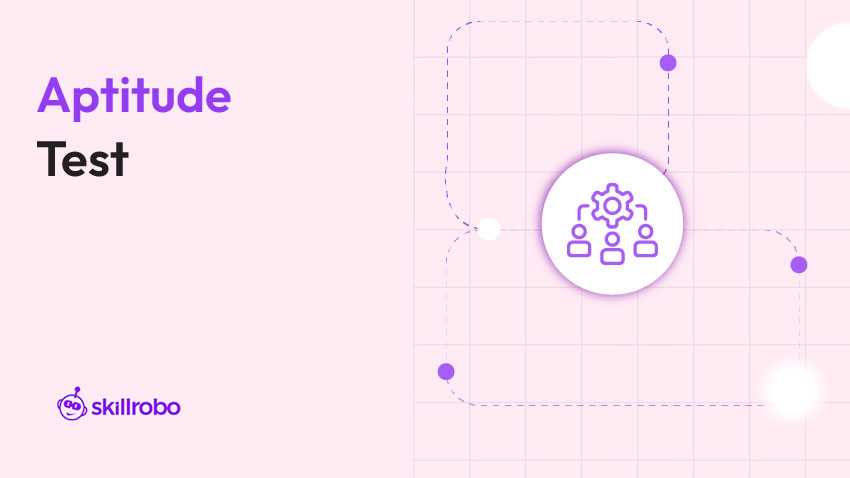
Key takeaways
- Aptitude tests help employers make data-driven recruitment decisions by predicting candidate success in specific roles.
- These tests assess a wide range of abilities, including numerical reasoning, verbal logic, and critical thinking skills.
- Career aptitude tests support skills-based hiring by identifying natural strengths and aligning them with job functions.
- AI talent assessment and skills assessment tools enhance accuracy, fairness, and scalability in pre-employment evaluations.
Why Aptitude Testing Matters Today
The hiring landscape has changed dramatically, with companies prioritizing talent quality and job-role fit over traditional resume screening. That’s where an aptitude test comes in. These assessments, often powered by modern aptitude test software, help organizations determine whether a candidate is likely to succeed in a specific role based on cognitive and behavioral indicators.
Whether you’re applying for your first job or switching careers, understanding what an aptitude test is can give you a crucial advantage. With pre-employment aptitude test platforms and AI-driven solutions, companies are leveraging data over guesswork to build more capable teams.
In this blog, we’ll break down the meaning, purpose, and types of aptitude tests while exploring their role in digital recruitment, talent management, and employee development.
What is an Aptitude Test?
An aptitude test is a standardized assessment used to evaluate a person’s natural abilities in specific skill areas. It helps predict how well an individual is likely to perform in a particular task or role by examining cognitive functions like problem-solving, pattern recognition, and verbal or numerical reasoning.
Unlike academic exams that test what you know, aptitude tests measure your potential to learn and apply skills, regardless of your educational background. They are widely used in hiring, education, and talent sourcing to identify individuals with the right capabilities for specific roles or responsibilities.
These assessments come in various forms, such as a career aptitude test, logical adaptive reasoning test, or verbal aptitude test, each designed to assess different dimensions of intelligence and ability. Employers often rely on aptitude test software to efficiently administer and evaluate these tests during the pre-employment assessment process.
For example, a career aptitude test can help a college graduate or job-seeker identify suitable roles based on their critical thinking or analytical strengths. Similarly, recruiters use employment aptitude tests to reduce hiring risks, eliminate bias, and ensure the selected candidate aligns with long-term business needs.
Key Features of an Aptitude Test:
- Measures cognitive abilities like logic, reasoning, and problem-solving
- Focuses on natural talent, not acquired knowledge
- Commonly used in pre-employment aptitude test stages
- Delivered through aptitude test software or online platforms
- Supports skills-based hiring and data-driven recruitment
- Helps employers assess candidate fit for roles requiring numerical, verbal, or logical reasoning
Why Aptitude Tests Matter in Modern Hiring
Aptitude testing has become a cornerstone of skills-based hiring, where decisions are made not just on experience or education, but on actual potential and core competencies. In a competitive job market where roles are constantly evolving, relying solely on resumes can be a limiting approach. Instead, organizations are turning to candidate assessment tools and AI talent assessment platforms to identify the right talent, faster and more fairly.
The result? More accurate hiring, reduced employee turnover, improved productivity, and better organizational alignment. Here’s how aptitude tests are reshaping recruitment strategies:
1. Shortlist candidates based on ability, not just credentials
Aptitude tests help filter candidates who may not have traditional qualifications but demonstrate strong analytical or problem-solving skills. This opens doors to diverse talent pools and ensures the focus is on actual performance potential, not just degrees or years of experience.
2. Enable bias-free and scalable screening processes
Automated pre-employment tests eliminate subjectivity from hiring. By using standardized assessments through aptitude test software, companies ensure every applicant is evaluated fairly based on consistent, measurable criteria, no matter their background.
3. Align recruitment with long-term talent management goals
Aptitude testing provides insights into an individual’s capacity to grow within the organization. This enables HR to match candidates not only to current vacancies but also to future roles, supporting talent mobility, succession planning, and leadership development.
4. Support data-driven and AI-enhanced decision-making
When integrated with AI talent assessment platforms, aptitude tests allow for more sophisticated evaluation models. These tools can analyze test results about job performance data, helping recruiters predict success and tailor onboarding or training programs accordingly.
In short, aptitude testing enables organizations to hire smarter, develop better, and retain top talent, resulting in a measurable impact on business outcomes.
Different Types of Aptitude Tests
Aptitude tests are not one-size-fits-all. They vary based on the role, industry, and competencies being measured. Understanding the different types of aptitude tests is essential for aligning hiring efforts with role-specific demands. These assessments form the foundation of employee aptitude test strategies, especially when using aptitude test software as part of your recruitment stack.
Here are the most common types of aptitude tests used in modern recruitment and talent development:
1. Numerical Aptitude Test
This test evaluates a candidate’s ability to interpret and manipulate numerical data. It includes tasks like solving equations, analyzing number patterns, interpreting graphs, and performing basic arithmetic.
- Best for: Finance, accounting, data analytics, engineering, and roles that require mathematical precision.
- Why it matters: It gauges quantitative reasoning and attention to detail, critical for data-driven decision-making.
2. Verbal Aptitude Test
This test measures reading comprehension, grammar, vocabulary, and the ability to understand and draw inferences from text.
- Best for: Customer service, marketing, content creation, sales, and public relations.
- Why it matters: Effective verbal communication is vital for roles involving collaboration, negotiation, and writing.
3. Logical Reasoning Aptitude Test
This type assesses a candidate’s ability to identify patterns, sequences, relationships, and apply structured thinking to solve abstract problems.
- Best for: Strategy, consulting, IT, and roles requiring high-level problem-solving or critical thinking.
- Why it matters: It reflects how quickly a person can learn new concepts and solve unfamiliar challenges.
4. Psychometric Aptitude Test
A more comprehensive form of aptitude testing, psychometric tests combine cognitive ability assessments with personality profiling to evaluate both skills and behavioral traits.
- Best for: Leadership roles, team management, or any role requiring emotional intelligence and interpersonal skills.
- Why it matters: It helps employers evaluate how well a candidate fits into company culture and team dynamics, reducing mis-hires.
5. Occupational Aptitude Test
This test is tailored to specific professions or industries and evaluates technical skills, knowledge, and relevant work-based behaviors.
- Best for: Healthcare, IT, manufacturing, logistics, and any specialized domain.
- Why it matters: These tests measure job-specific aptitude, ensuring candidates possess both the foundational and applied skills needed to perform well.
Each of these pre-employment assessment tests can be customized or combined using modern aptitude test software to create a holistic candidate profile. By choosing the right mix of tests, employers can ensure that hiring decisions are based on objective, role-relevant data rather than assumptions or surface-level indicators.
How Employers Use Aptitude Tests
In this era of skills-based hiring, aptitude tests have become a central tool for employers seeking to build high-performing teams. These pre-employment assessment tests are often integrated into applicant tracking systems (ATS) and automated platforms, allowing for efficient and scalable candidate evaluations.
Here’s how employers typically use aptitude tests in a step-by-step process:
Step 1: Initial Screening and Filtering
Employers use aptitude tests early in the hiring process to filter candidates efficiently. Rather than relying on resumes alone, tests help identify individuals with the right cognitive and behavioral traits.
Step 2: Benchmarking and Comparison
Results from aptitude testing are used to benchmark performance across applicants. This allows recruiters to make objective comparisons and shortlist the best-fit candidates for interviews or role-specific tasks.
Step 3: Role Fit and Development Mapping
Using insights from test results, employers align candidates with the roles where they can excel. This supports better job-role fit, reducing turnover and increasing engagement.
Step 4: Post-Hire Development and Upskilling
Many organizations incorporate aptitude testing into employee evaluation software. This helps in tracking skill progression, conducting a training needs analysis, and creating tailored development plans for talent growth and succession planning.
Benefits of Using Aptitude Tests in Recruitment
In a highly competitive talent market, hiring the right candidate requires more than just reviewing resumes and conducting interviews. Organizations are now embracing data-driven recruitment strategies, and aptitude tests play a key role in that shift. By evaluating candidates on their innate strengths, cognitive capabilities, and problem-solving skills, these tests offer tangible benefits that improve hiring outcomes across industries.
Here’s how integrating aptitude testing into the recruitment process creates a measurable impact:
1. Objective Evaluation
Aptitude tests offer standardized scoring systems that help eliminate unconscious bias. Recruiters assess candidates based on ability, not background, resulting in fairer and more inclusive hiring decisions.
2. Time Efficiency
By filtering out unqualified candidates early, aptitude tests significantly reduce time-to-hire. Automated test platforms streamline the process, saving valuable recruiter hours and improving operational efficiency.
3. Predictive Accuracy
These tests are designed to correlate closely with job performance. Whether it’s a numerical aptitude test for finance roles or a verbal aptitude test for customer service, they help match talent to role expectations with higher precision.
4. Scalability
Aptitude testing supports high-volume hiring needs through automation. From startups to large enterprises, recruiters can assess thousands of candidates simultaneously without compromising on quality or speed.
5. Strategic Planning
Test results feed into broader talent mobility and workforce planning initiatives. Organizations can use the insights for internal promotions, lateral movement, reskilling efforts, and succession planning.
How Aptitude Tests Support Talent Development
Beyond hiring, aptitude testing plays a key role in talent development assessment. Managers use test results to:
- Identify skill gaps
- Assign targeted learning modules
- Prepare employees for leadership roles
When paired with skill mapping tools, organizations gain visibility into workforce capabilities and potential, enabling better succession planning.
Aptitude Tests vs. Other Pre-employment Assessments
When hiring, organizations often use a mix of assessments to evaluate candidates, but not all tests serve the same purpose. Aptitude tests are specifically designed to measure a candidate’s ability to think critically, solve problems, and learn quickly, skills that directly relate to job performance. In contrast, personality tests assess traits like introversion, conscientiousness, or emotional stability, which may influence cultural fit but are not direct predictors of job success.
Skills tests evaluate a candidate’s ability to perform specific tasks, such as coding or typing. These are valuable when hiring for roles that require mastery of a known skill. However, they don’t measure cognitive agility or potential to grow in a role—something aptitude tests excel at. Situational judgment tests (SJTs) present hypothetical workplace scenarios to evaluate decision-making and interpersonal skills, making them useful complements but not substitutes for aptitude assessments.
Understanding the differences helps organizations choose the right combination of tools. Aptitude tests are especially powerful in early screening, while personality, technical, and SJTs provide more nuanced insight during later stages.
Here is a table comparing different tests –
| Assessment Type | Purpose | Strengths | Limitations |
|---|---|---|---|
| Aptitude Tests | Measure cognitive abilities such as logic, reasoning, and learning speed | Strong predictor of job performance, especially in analytical roles | Do not assess soft skills or personality traits |
| Personality Tests | Evaluate traits like openness, conscientiousness, and emotional stability | Useful for assessing culture fit and workplace behavior | Not directly linked to job performance |
| Skills Tests | Assess ability to complete specific tasks (e.g., typing, coding) | Good for roles with clear technical requirements | Do not measure potential, problem-solving, or adaptability |
| Situational Judgment Tests | Present work-related scenarios to evaluate decision-making and interpersonal judgment | Reflect real-life situations, useful for roles requiring high emotional intelligence | Results can be subjective and influenced by the test-taker’s interpretation |
| Integrated Use Strategy | Combining multiple assessments to cover various candidate dimensions | Ensures a well-rounded hiring decision by balancing cognitive, behavioral, and practical competencies | It can be time-consuming and requires proper interpretation by hiring professionals |
Aptitude Test Example Questions
Aptitude tests are designed to measure how candidates think, reason, and solve problems, often under time constraints. These questions give employers insights into a person’s potential to perform in a role, regardless of their previous experience or education. Below are common aptitude test examples across key categories:
Numerical Reasoning Example Questions
These questions assess your ability to work with numbers, interpret data, and solve math-related problems.
- Workforce Efficiency:
“If 3 workers can complete a task in 4 days, how many days will it take 6 workers to complete the same task?”
Correct Answer: 2 days - Percentage Calculation:
“A product originally priced at $250 is now being sold at a 20% discount. What is the discounted price?”
Correct Answer: $200
Verbal Reasoning Example Questions
These assess your language comprehension, vocabulary, and ability to interpret written information.
- Synonym Selection:
“Choose the word that is most similar to ‘benevolent’:
A) cruel B) kind C) passive D) arrogant”
Correct Answer: B) kind - Sentence Completion:
“Despite the complexity of the task, she completed it with _____ attention to detail.
A) negligible B) meticulous C) erratic D) careless”
Correct Answer: B) meticulous
Logical Reasoning Example Questions
These evaluate your ability to recognize patterns, sequences, and relationships between abstract concepts.
- Pattern Recognition:
“Which shape completes the pattern?
[Diagram sequence of increasing sides: triangle → square → pentagon → ?]”
Correct Answer: Hexagon - Sequence Logic:
“Find the next number in the series: 2, 6, 12, 20, ___
A) 30 B) 32 C) 28 D) 34″
Correct Answer: A) 30
These examples demonstrate the breadth of aptitude testing and how each test targets different areas of cognition. Including such questions in your recruitment process ensures a deeper understanding of each candidate’s potential. Let me know if you’d like to include a visual or quiz-style format for this section.
How to Interpret Aptitude Test Results Accurately
Interpreting aptitude test results isn’t just about scores, it’s about understanding potential. Most platforms provide raw scores, percentile rankings, and performance breakdowns by category (e.g., numerical, logical, verbal). A candidate scoring in the 80th percentile for logical reasoning, for instance, indicates they outperform 80% of test-takers in that domain.
Look for patterns: Does the candidate perform better in abstract reasoning than in numerical reasoning? This could suggest a strategic thinker more suited for planning roles than finance-heavy positions. Don’t rely on absolute thresholds—consider the role’s needs. A role requiring quick thinking and multitasking might favor high scores in problem-solving and cognitive speed.
Finally, train hiring managers to use data dashboards or visualizations, often provided by employee evaluation software, to align test insights with hiring decisions. Combining aptitude scores with resume data, interviews, and job simulations ensures a more holistic assessment.
Role-Specific Aptitude Testing Strategies
One-size-fits-all assessments are no longer sufficient in today’s skills-based hiring environment. The cognitive and behavioral demands of job roles vary significantly, so organizations must tailor their aptitude testing strategy to match the unique expectations of each position. A strategic mix of pre-employment assessment tests ensures precision in hiring, rather than relying on guesswork or generic evaluations.
1. Software Developers
Software development requires analytical thinking, structured problem-solving, and the ability to work with abstract concepts. Aptitude tests for this role should focus on logical reasoning and numerical aptitude, evaluating how well candidates understand algorithms, debug code, and analyze logical sequences. Custom problem-solving tests using pseudo-code, flowcharts, or logic puzzles can provide deeper insight into coding potential and tech adaptability. This role benefits from skill assessment frameworks that measure both technical depth and logical fluency.
2. Sales Executives
In sales roles, communication is everything. Testing should emphasize verbal reasoning, reading comprehension, and emotional intelligence. Assessments might include simulated client interactions or passages requiring a persuasive response. Measuring how candidates handle objections, negotiate solutions, and convey value propositions is key to predicting success in this highly interpersonal role. Skill mapping tools can be used post-assessment to align these aptitudes with specific competencies required for various sales environments.
3. Data Analysts
Data roles demand a high cognitive load in math-heavy environments. Aptitude tests here should focus on numerical reasoning, pattern recognition, and data interpretation. Effective questions include chart analysis, basic statistics, ratios, and probability-based logic. These tests not only screen for mathematical skill but also the candidate’s ability to make data-driven decisions quickly and confidently.
4. Customer Service Roles
These positions require empathy, clarity, and multitasking. Ideal assessments include verbal aptitude tests, situational judgment tests (SJTs), and simulation-based multitasking modules. This helps recruiters assess how well candidates respond to customer concerns, process information quickly, and juggle multiple communication channels without losing accuracy or composure.
5. Operations/Project Managers
Project and operations managers must think strategically and act tactically. Testing should include logical sequencing, spatial reasoning, and critical thinking assessments. These tests evaluate the candidate’s ability to plan workflows, allocate resources, and troubleshoot delays. Scenario-based problem-solving tasks work well here to simulate real-world pressure and help gauge leadership readiness.
Top 20 Aptitude Test Tools to Streamline Skills-Based Hiring
1. Skillrobo
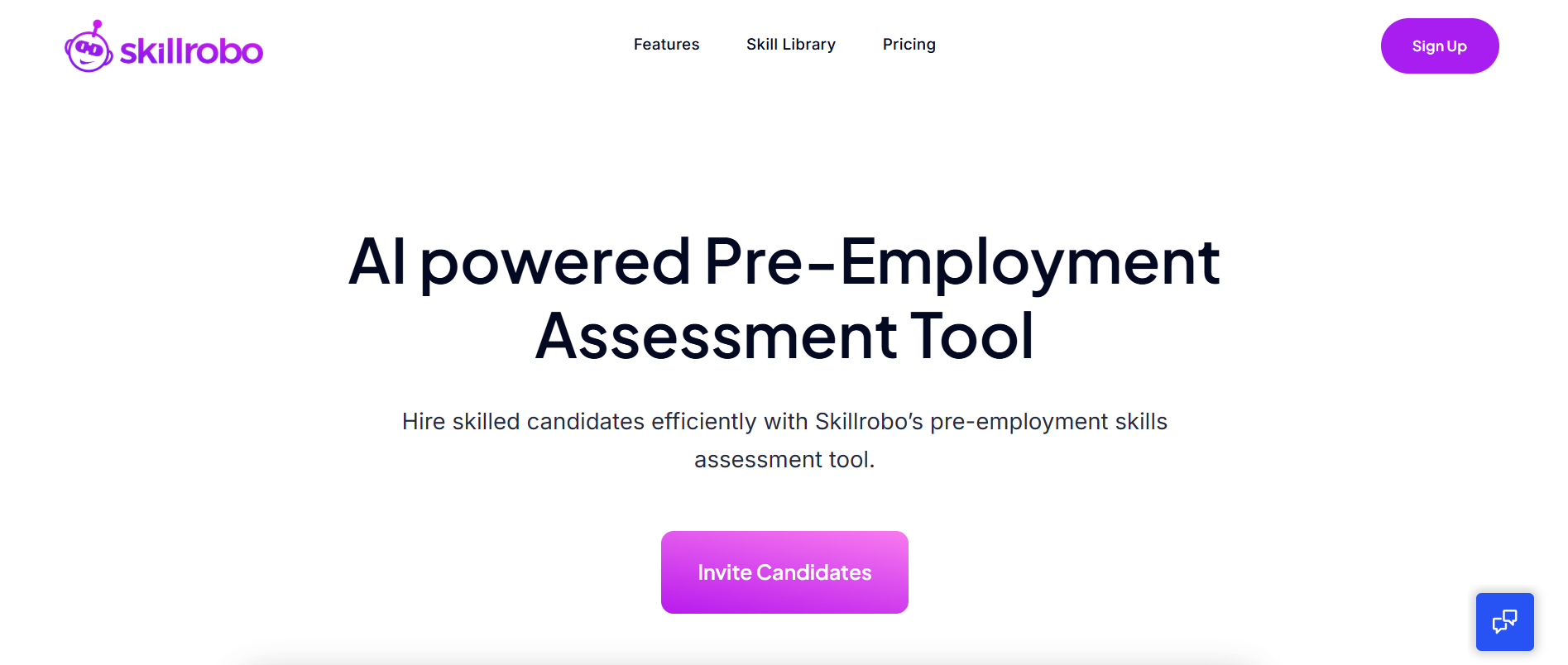
Skillrobo is a customizable pre-employment assessment platform built for modern hiring teams. It enables businesses to test candidates across cognitive, technical, and behavioral areas using aptitude, coding, or soft skill assessments, backed by anti-cheating and live proctoring measures.
- Custom test builder with domain-specific questions
- Live proctoring and anti-cheating features
- Real-time analytics and candidate reports
id=”13805″]
2. TestGorilla
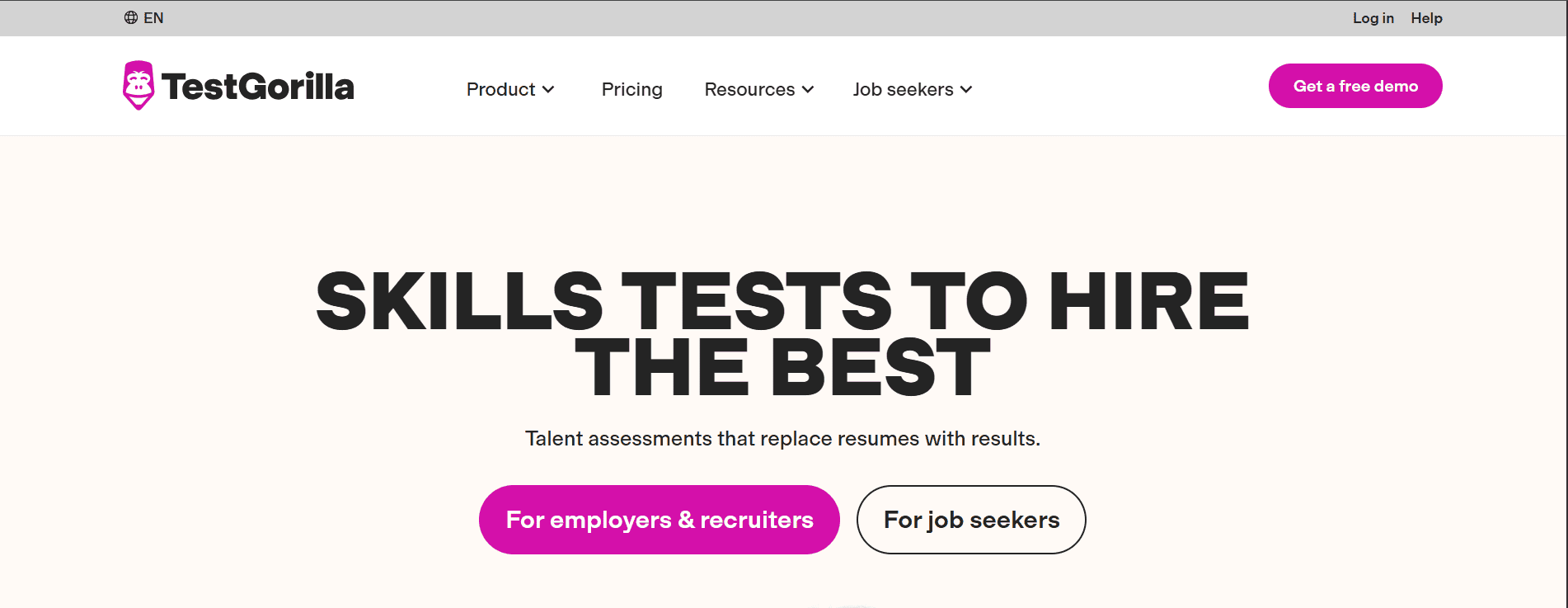
Source: TestGorilla
TestGorilla offers a broad library of pre-built aptitude and behavioral tests. It’s designed to help employers make hiring decisions based on data rather than resumes or gut feeling.
- 300+ test library, including numerical and logical reasoning
- Anti-cheating tools and video monitoring
- ATS integrations for seamless hiring workflows
3. Mercer Mettl
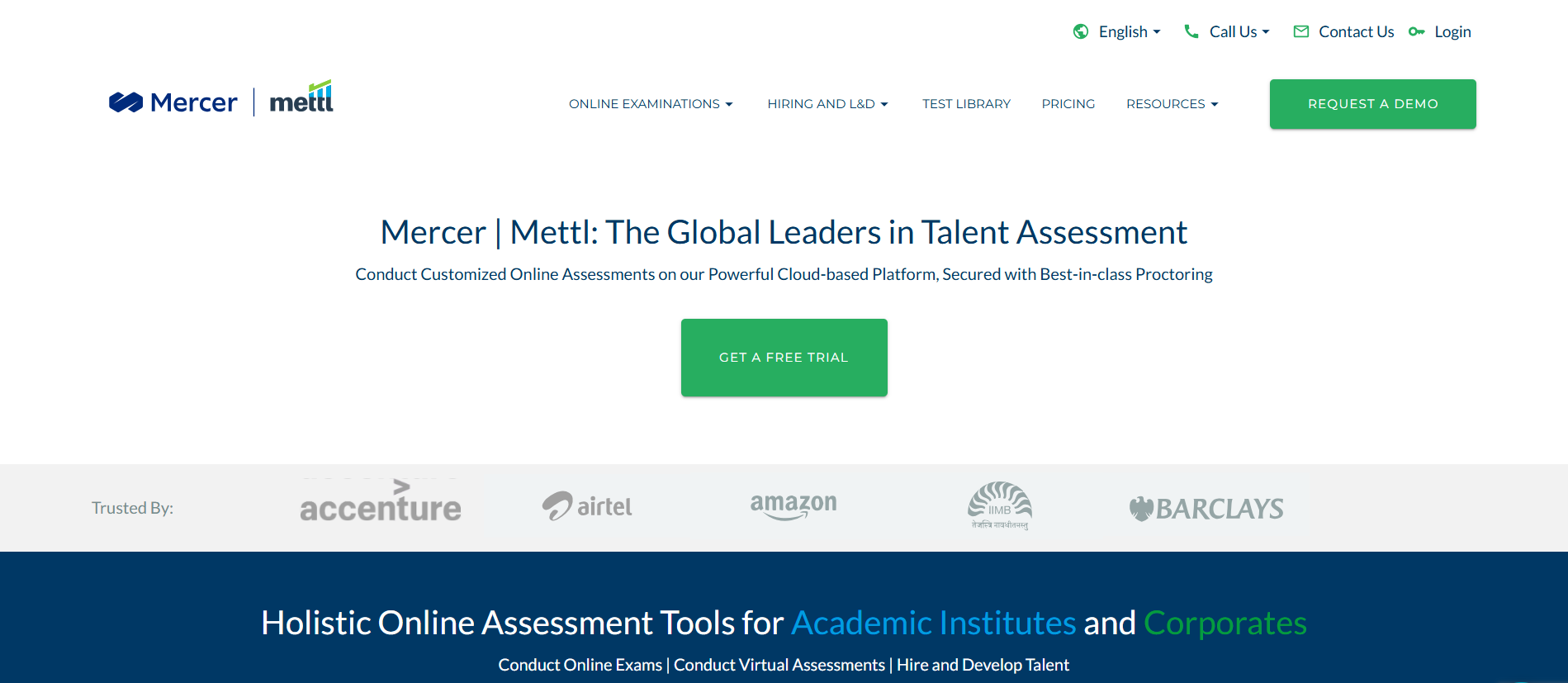
Source: Mercer Mettl
Mercer Mettl provides scalable aptitude and psychometric assessments tailored to job roles. It is trusted by global enterprises for its secure, customizable tests and AI-powered proctoring.
- Adaptive aptitude test formats
- AI-driven cheating prevention
- Supports large-scale hiring and campus drives
4. Codility
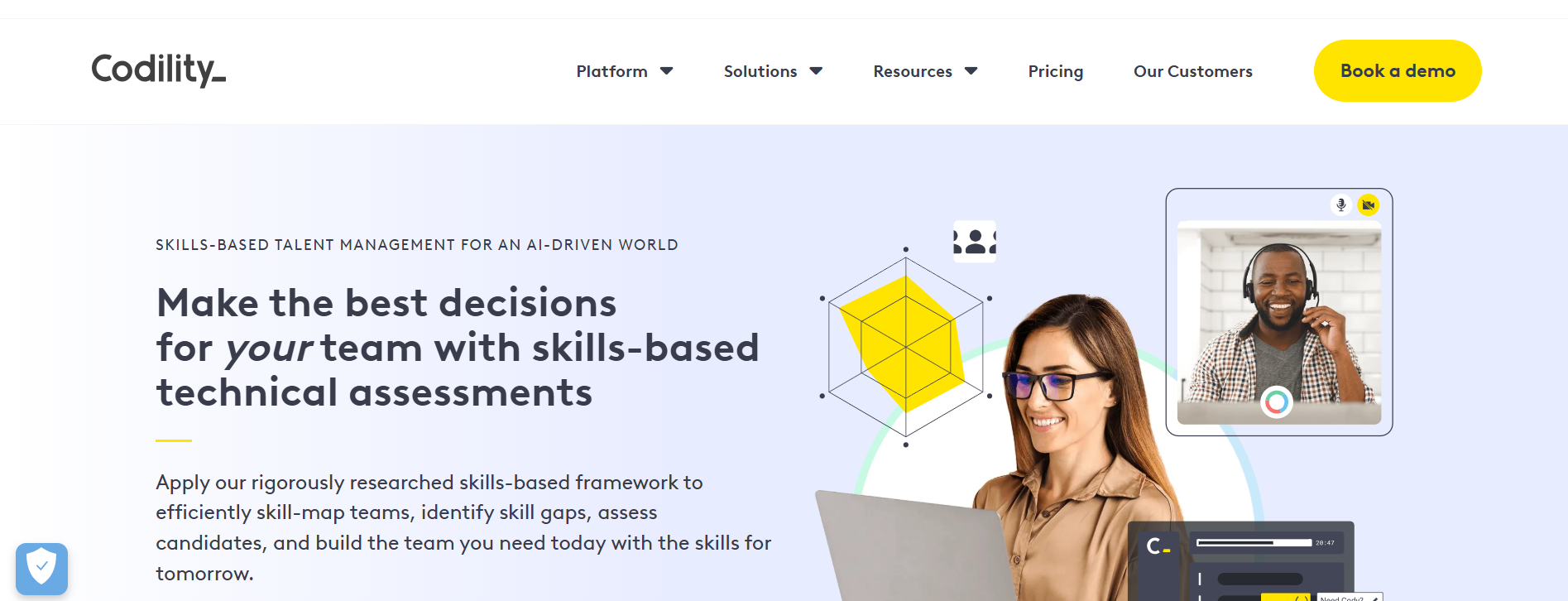
Source: Codility
Codility is ideal for tech hiring with strong logical reasoning and code-based aptitude challenges. It helps recruiters identify analytical thinking alongside programming proficiency.
- Logical problem-solving with coding tasks
- Scoring benchmarks and automated evaluation
- Remote-friendly with a secure testing environment
5. eSkill
eSkill allows for modular test creation with aptitude, job knowledge, and behavioral test types. It’s known for detailed reports and test customization.
- Custom and pre-built aptitude tests
- Video interview integration
- Detailed scoring and benchmarking
6. iMocha
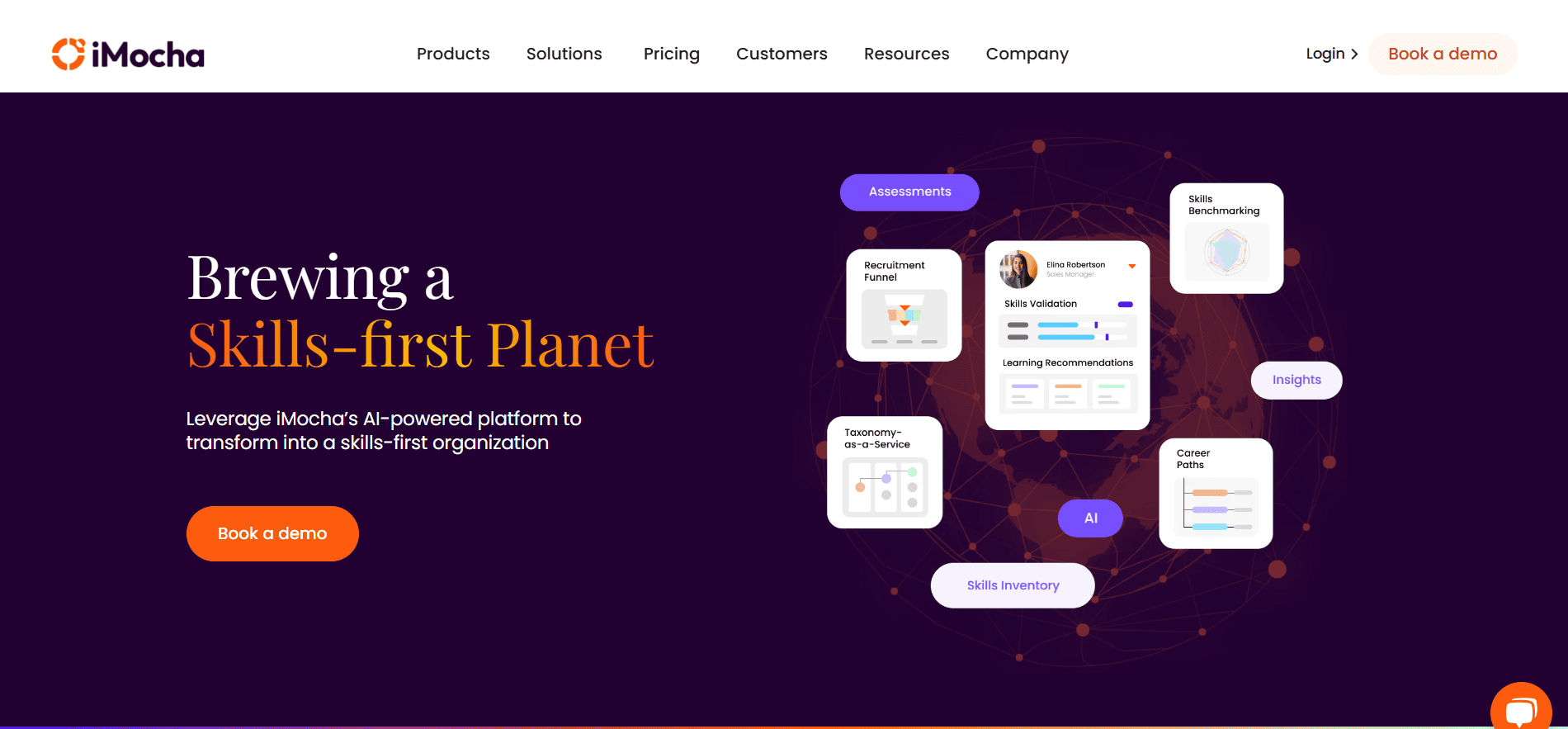
Source: iMocha
iMocha’s AI-powered platform is built for enterprise hiring. It offers skill assessments across IT, finance, and general aptitude categories.
- Cognitive and domain-based aptitude assessments
- AI-powered skill indexing and benchmarking
- Role-based test customization
7. Talview
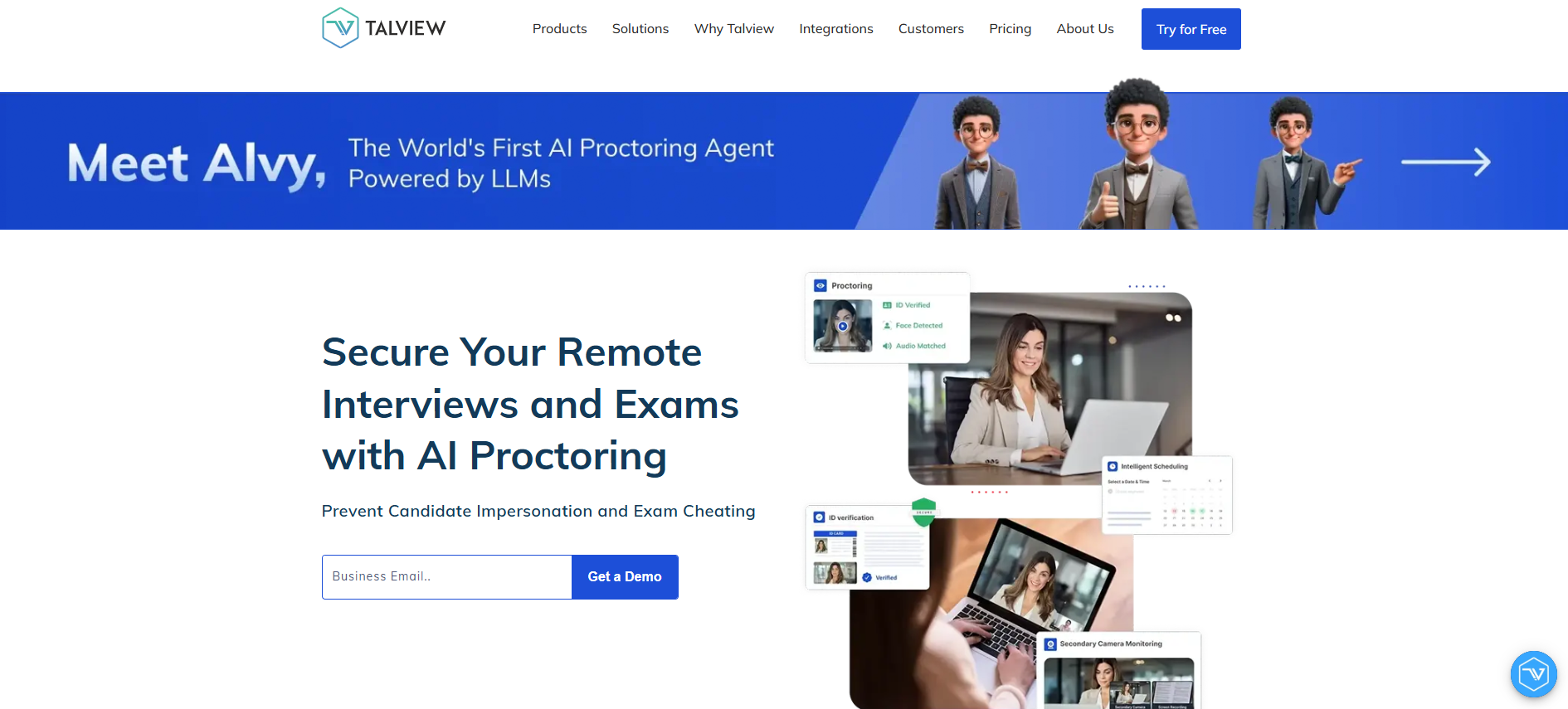
Source: Talview
Talview provides pre-employment testing with AI-driven insights, behavioral analysis, and video interviews. It’s ideal for remote hiring and large-scale assessments.
- Psychometric and aptitude test support
AI-backed proctoring and behavioral analysis
End-to-end remote recruitment platform
8. HireVue
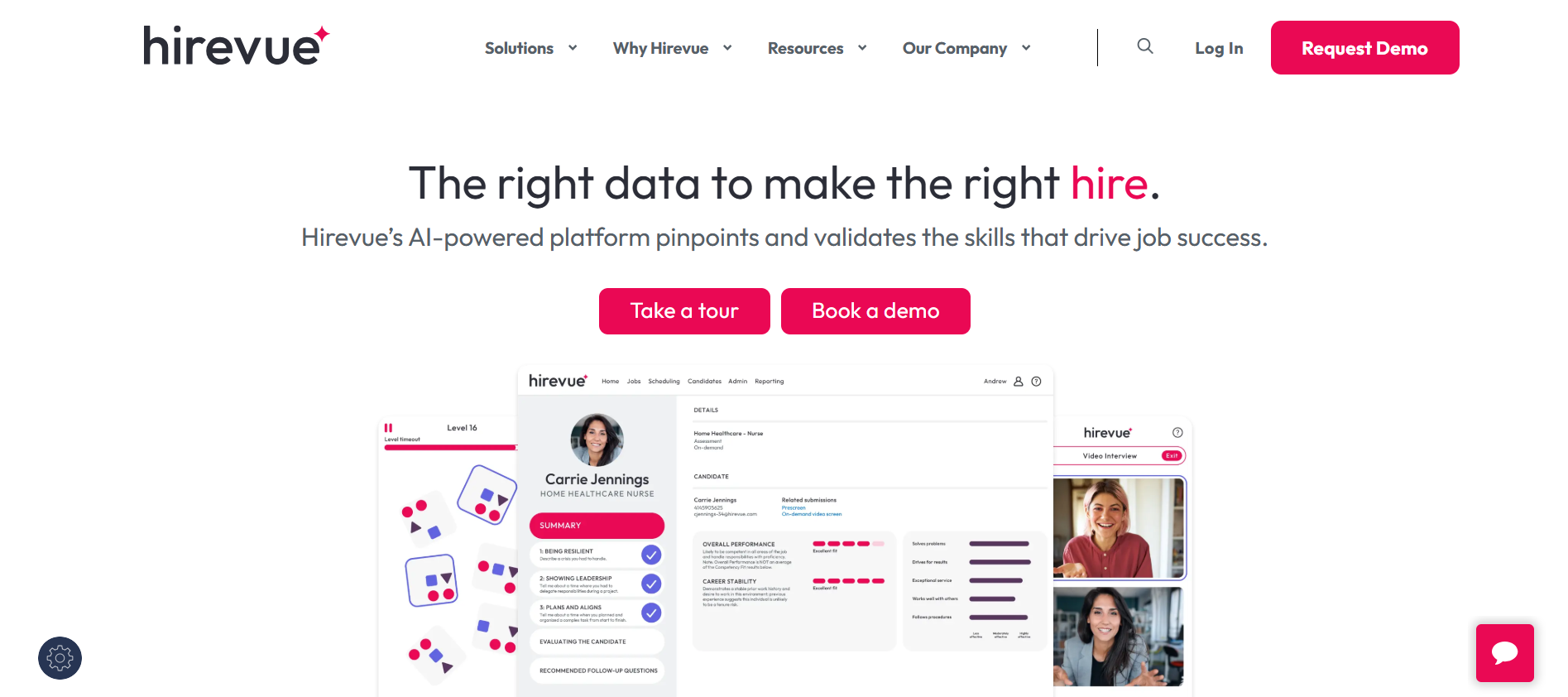
Source: HireVue
HireVue combines structured interviews with game-based assessments and aptitude testing. It’s especially useful for large enterprises using structured digital hiring pipelines.
- Game-based aptitude tests
- Predictive analytics on candidate fit
- Integrates with leading HR tech platforms
9. Adaface
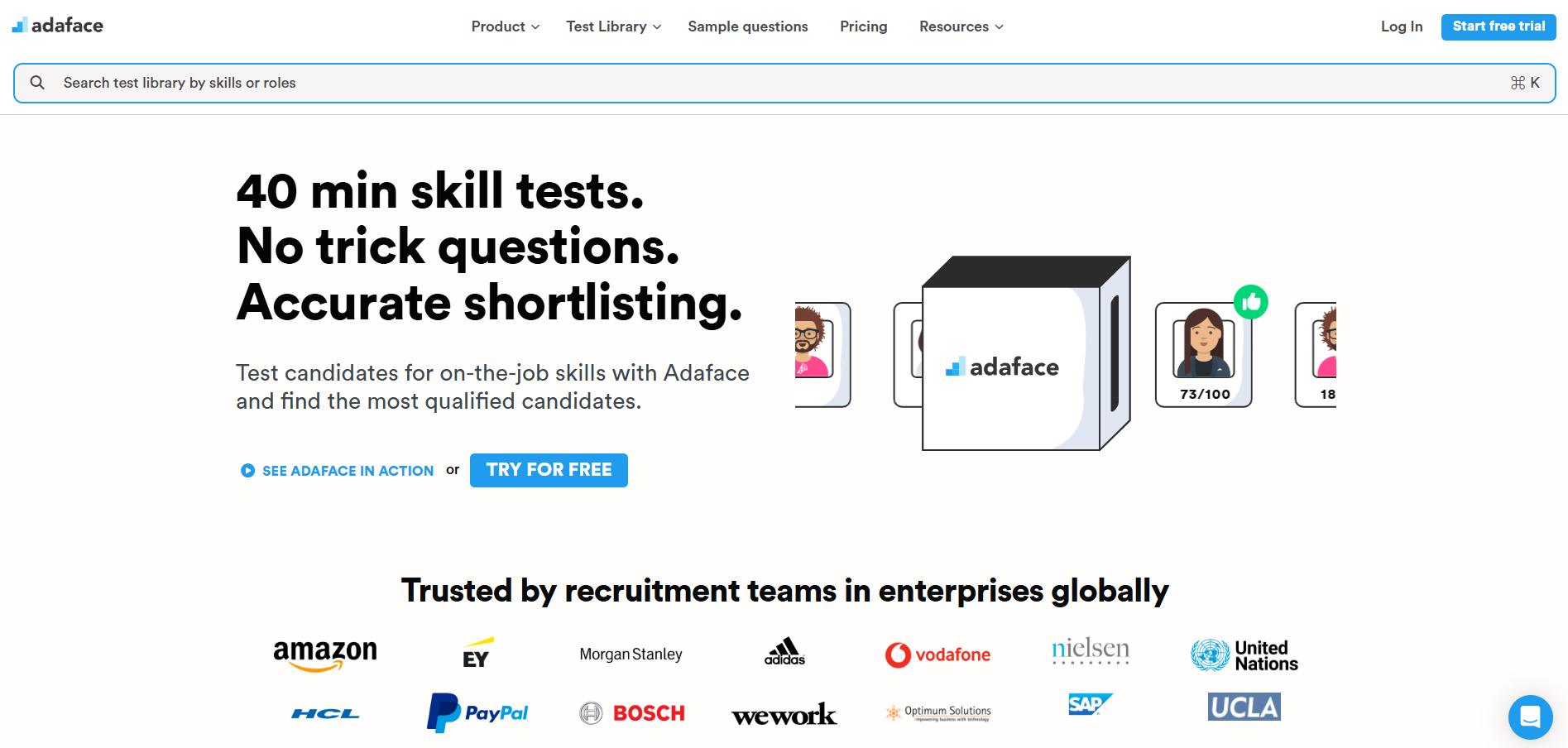
Source: Adaface
Adaface offers conversational assessments that mimic real-world problem-solving. It focuses on candidate experience while evaluating aptitude and job skills.
- Conversational AI-based test interface
- Aptitude, coding, and logic test options
- Role-based difficulty calibration
10. Harver
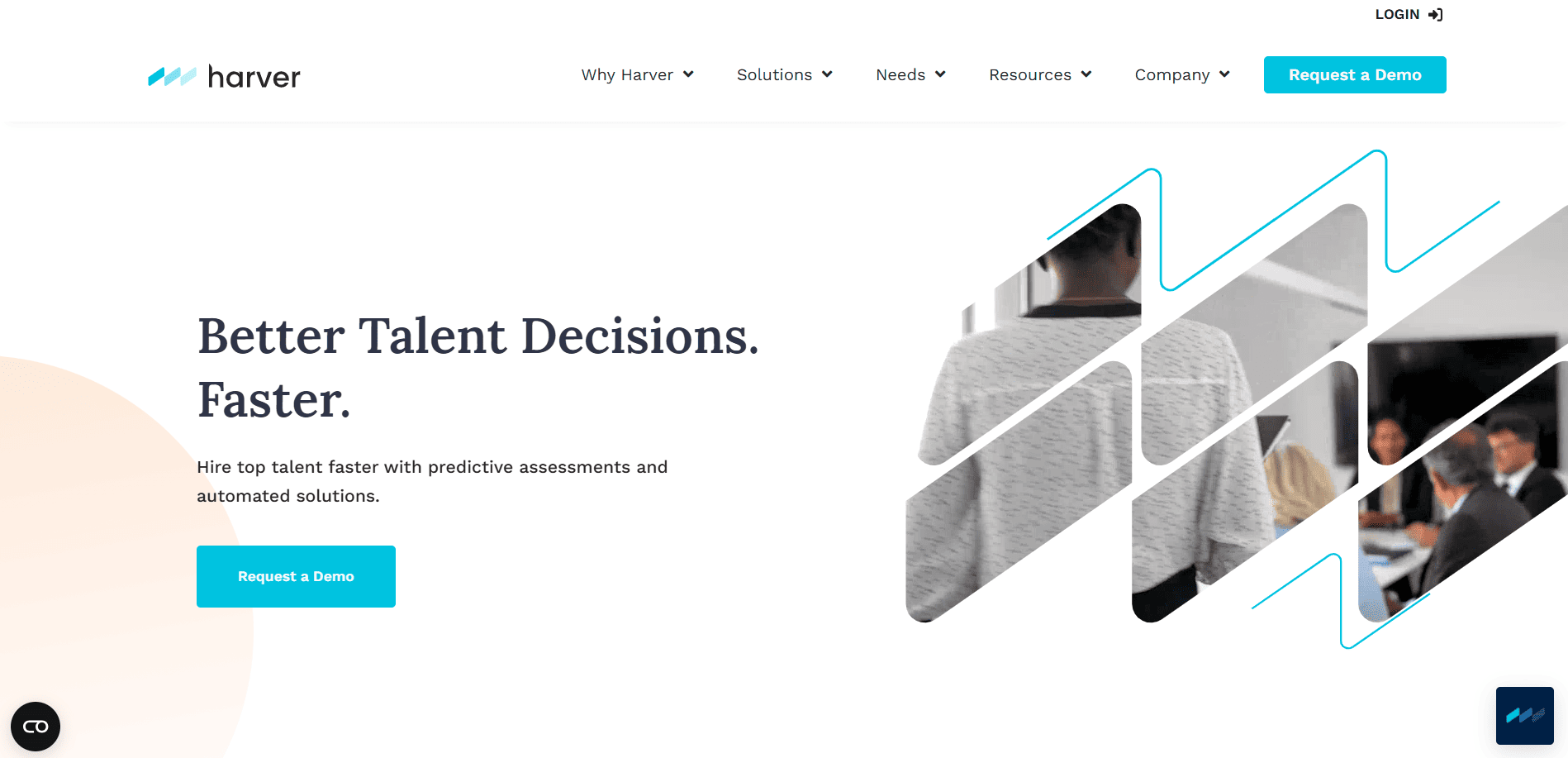
Source: Harver
Harver specializes in volume hiring with aptitude tests embedded in its end-to-end recruitment suite. It helps filter high-potential candidates efficiently and fairly.
- Situational judgment and cognitive ability tests
- Fully branded candidate experience
- Integrated assessment and hiring pipeline
11. Glider AI

Source: Glider AI
Glider AI is a talent quality platform that offers role-based aptitude, coding, and skill assessments tailored to real-world tasks. Used by staffing firms and enterprises, it ensures hiring decisions are based on verified skills and job-readiness.
- Role-specific real-world aptitude scenarios
- AI-powered proctoring and fraud detection
- Seamless ATS and VMS integrations
12. Wonderlic
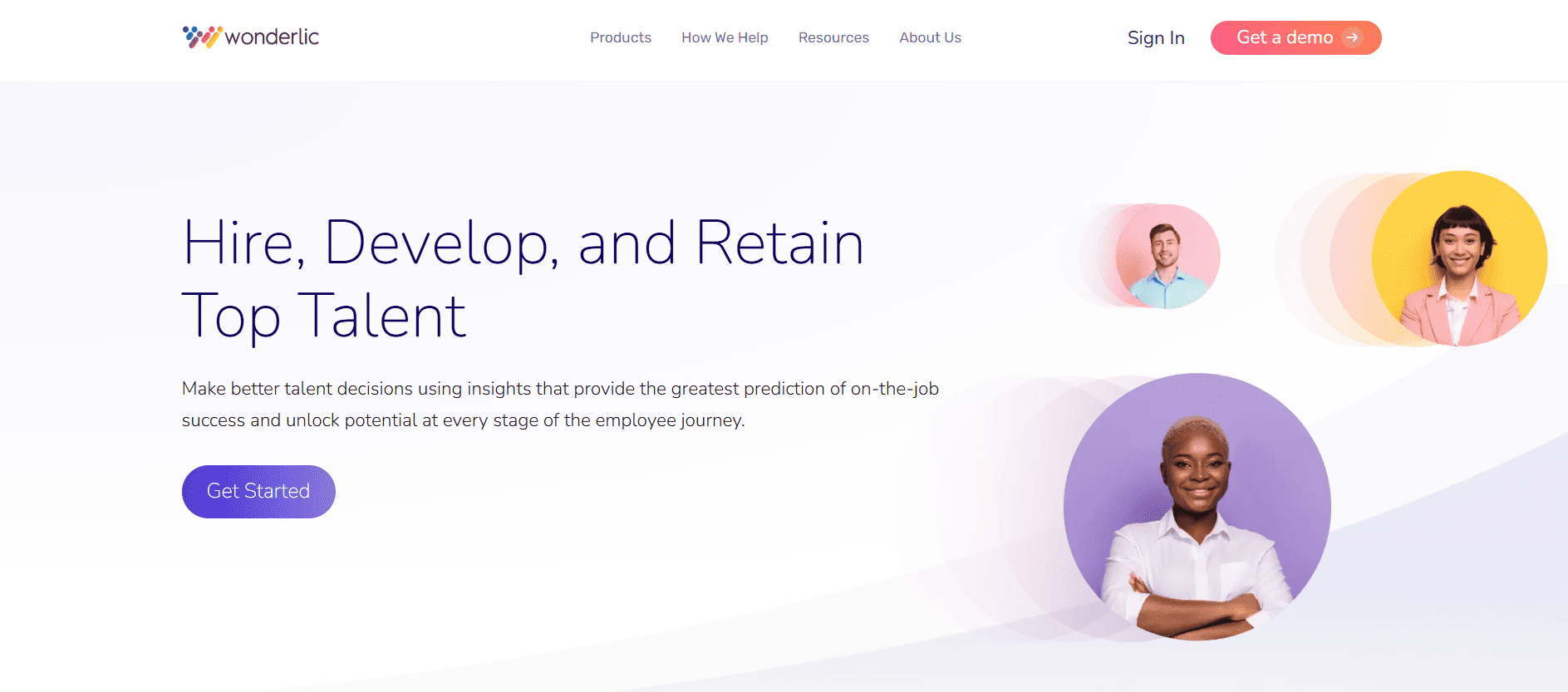
Source: Wonderlic
Wonderlic offers quick, reliable aptitude and personality assessments that help predict job performance. Its signature 12-minute test measures cognitive ability across math, logic, and verbal skills, often used for high-volume hiring or initial screening.
- Short-form cognitive tests (12 minutes)
- Easy-to-interpret percentile scoring
- Widely used in the public and private sectors
13. Predictive Index

Source: The Predictive Index
Predictive Index blends cognitive aptitude with behavioral data to create a full picture of candidate potential. It’s built for strategic hiring and long-term talent development, focusing on how individuals will behave and think on the job.
- Behavioral + cognitive aptitude pairing
- Job-target profiles and cultural fit insights
- Visual reporting and team fit modeling
14. Wheebox
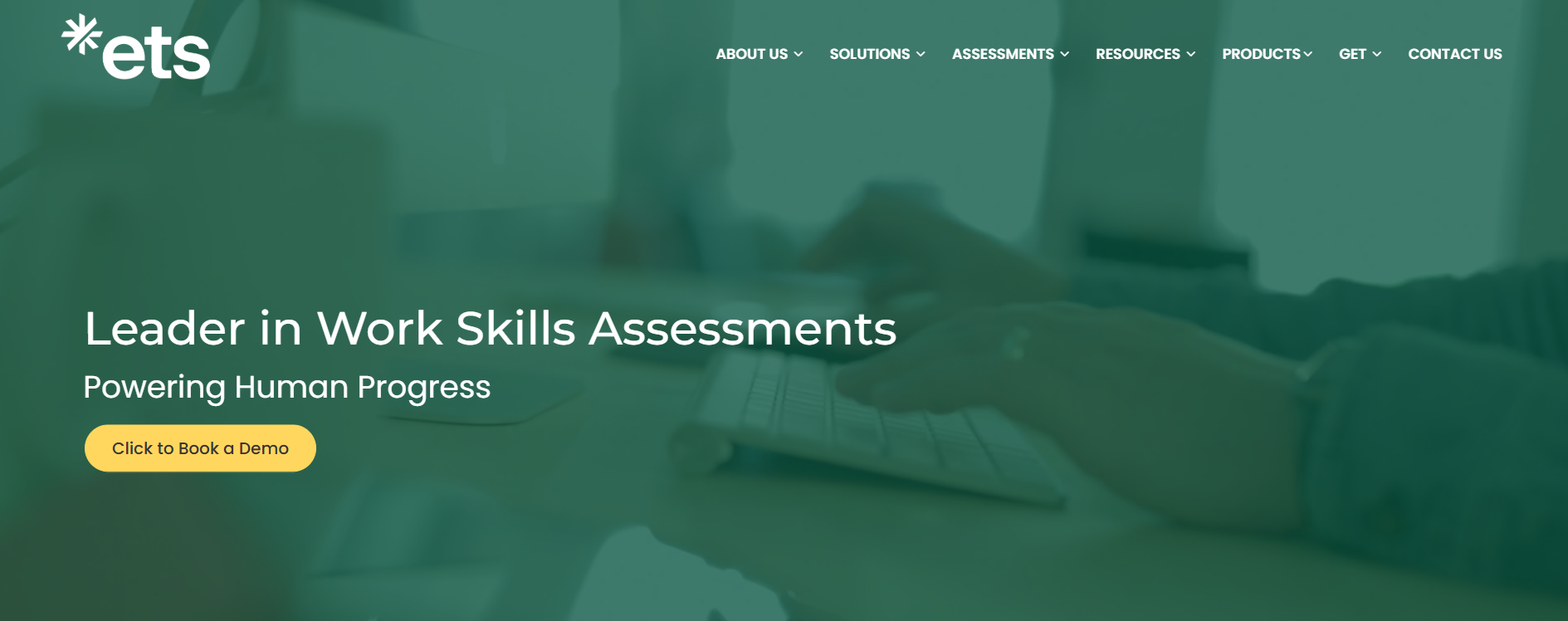
Source: Wheebox
Wheebox is an AI-enabled assessment platform for employability, campus hiring, and lateral recruitment. It supports large-scale aptitude and psychometric assessments with real-time analytics, ideal for enterprise and academic use.
- Job role-specific cognitive testing
- Secure remote proctoring with AI
- Real-time dashboards and reports
15. Criteria Corp
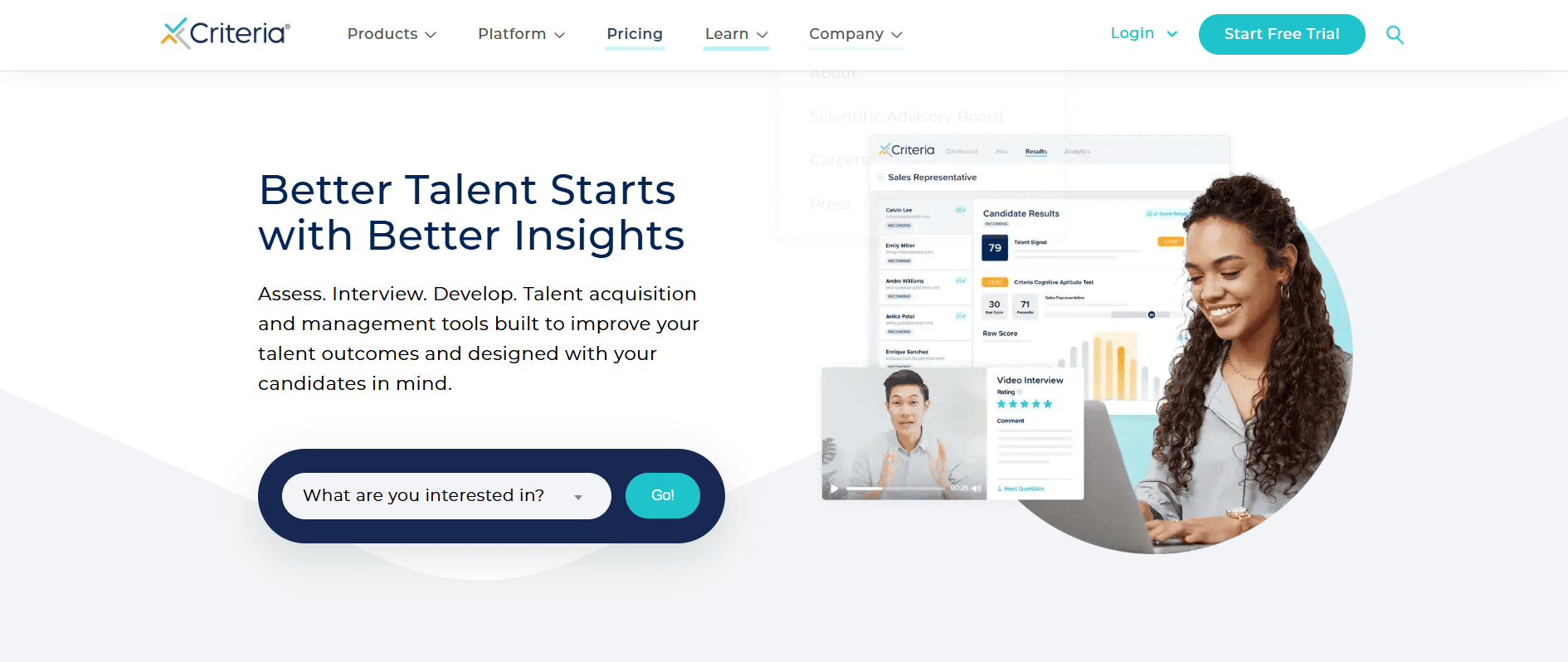
Source: Criteria Corp
Criteria Corp provides pre-employment assessments with a focus on scientific validity. It includes aptitude, emotional intelligence, and personality tests designed to improve hiring quality while reducing bias.
- Game-based cognitive ability tests
- EEOC-compliant assessment design
- Behavioral and aptitude test combinations
16. ExamSoft
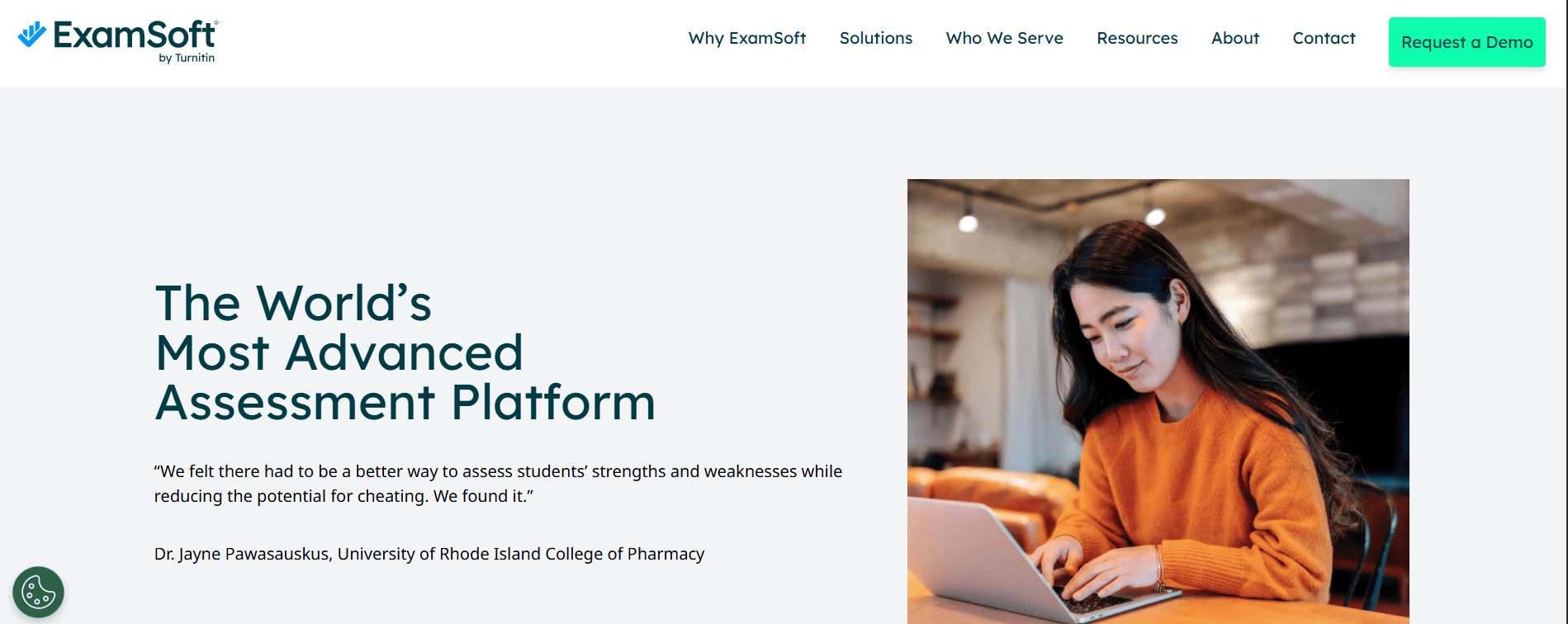
Source: ExamSoft
ExamSoft is a secure assessment platform ideal for education and certification bodies. It supports offline testing, performance analysis, and customized feedback, often used for technical or cognitive aptitude evaluations.
- Offline delivery with full proctoring
- Item analysis and performance tagging
- High-stakes assessment security
17. Synap
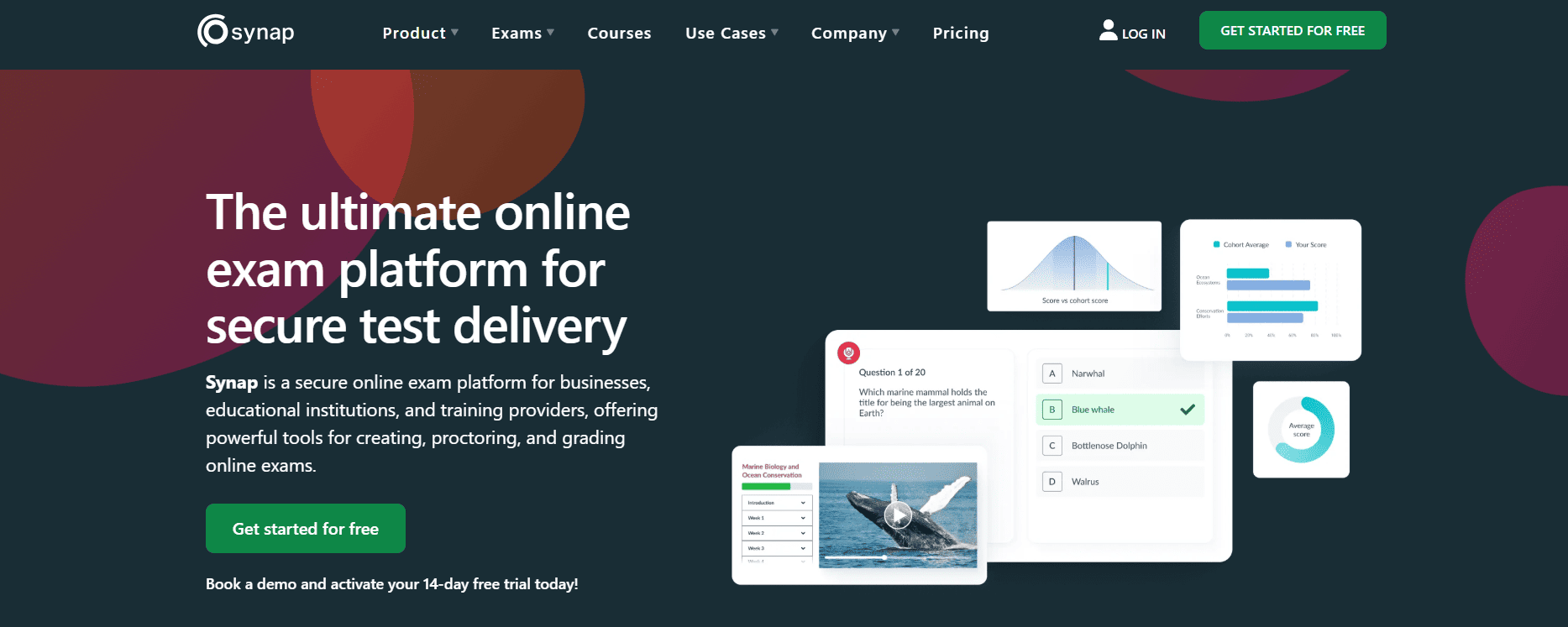
Source: Synap
Synap is an intelligent learning and assessment platform with adaptive testing and deep analytics. It helps teams evaluate reasoning, knowledge retention, and performance over time in a secure, flexible environment.
- Adaptive testing engine
- Anti-cheating and timed question delivery
- Learning + assessment in one platform
18. HireMee
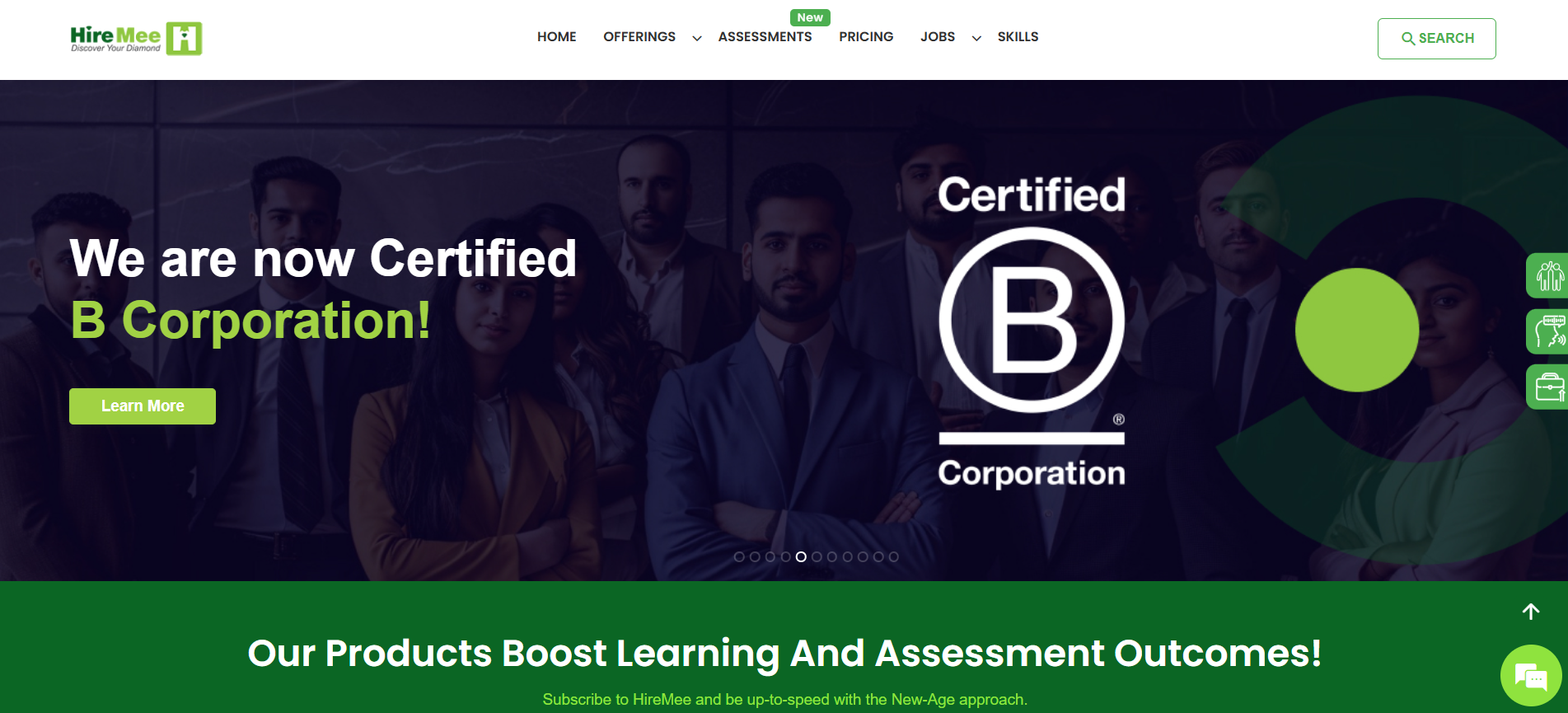
Source: HireMee
HireMee is a mobile-first assessment tool designed to reach candidates in underserved regions. It offers role-based aptitude and communication assessments with video profiling, ideal for volume hiring.
- Mobile-accessible aptitude assessments
- AI-based candidate profiling
- Industry-aligned question bank
19. TAO Testing

Source: TAO Testing
TAO is an open-source platform for creating, delivering, and analyzing assessments. It supports large-scale, customizable aptitude tests and complies with international standards for education and enterprise use.
- Modular, open-source assessment engine
- SCORM and QTI compatibility
- Fully customizable cognitive test flows
20. ThriveMap
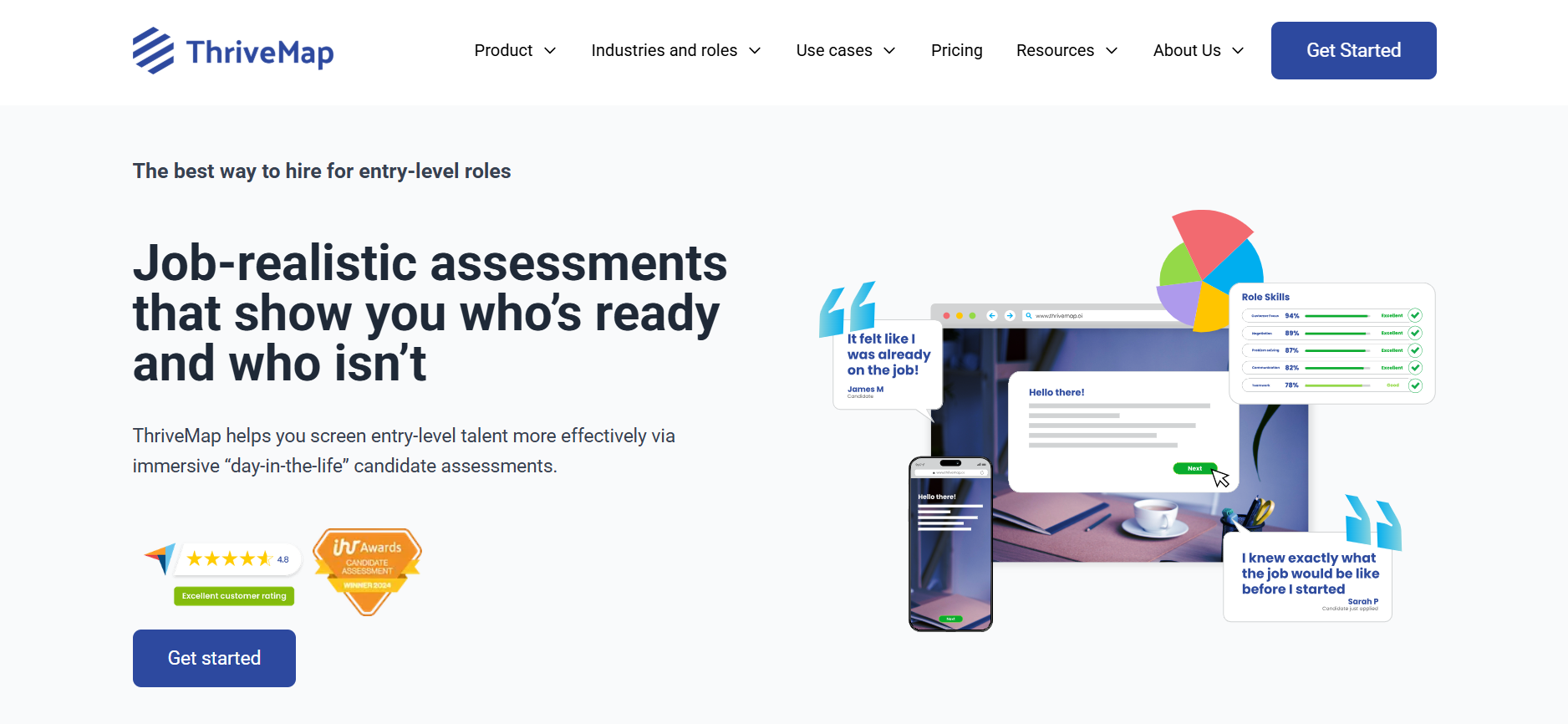
Source: ThriveMap
ThriveMap delivers realistic, scenario-based assessments that combine aptitude with behavioral fit. It creates role simulations tailored to each company, improving the prediction of job success and culture alignment.
- Realistic job preview simulations
- Custom assessments based on workflow
- Strong predictive validity for job fit
Compliance and Ethical Considerations in Aptitude Testing
Using aptitude tests responsibly is essential to ensure fairness, legal compliance, and ethical integrity. In the U.S., the Equal Employment Opportunity Commission (EEOC) mandates that assessments must not discriminate against protected groups. Ensure your chosen pre-employment tests are validated for job relevance and regularly updated to reflect evolving workplace demands.
Accessibility is equally important. Candidates with disabilities should receive appropriate accommodations, such as extended time or screen readers. International regulations like GDPR (in the EU) or India’s PDP Bill require that candidate data be stored securely and with informed consent.
Choose vendors who prioritize data encryption, candidate anonymity, and opt-out options. Always communicate clearly to candidates why the test is being used and how the results will influence hiring decisions. Transparency not only ensures compliance, but it also builds trust with applicants.
How to Choose the Right Aptitude Test Platform
Selecting the right testing platform is crucial. Start by identifying whether you need basic testing or advanced analytics. A strong tool should offer customizable test libraries covering cognitive, behavioral, and technical domains.
Check for integration capabilities with ATS, HRIS, or LMS platforms to ensure seamless workflows. Real-time dashboards and skill assessment tools should be included for easy interpretation. Make sure the platform supports remote testing with proctoring features like webcam monitoring and browser lock.
Security and compliance features are must-haves. Look for platforms that meet ISO, GDPR, or EEOC standards. Ask about their question pool—is it updated regularly? Finally, test the candidate experience: Is the interface intuitive and mobile-friendly?
Checklist: Best Practices for Using Aptitude Tests in Hiring
Aptitude testing is only as effective as its implementation. To get the most out of these tools, organizations must adopt structured, inclusive, and strategically aligned practices. Here’s a comprehensive checklist to guide you:
1. Align tests with job roles
Avoid generic, one-size-fits-all evaluations. Instead, tailor your assessments based on the cognitive and behavioral needs of the role. This ensures relevance and improves the accuracy of predictions, essential for effective data-based recruitment.
2. Provide practice options
Candidates often perform better when they know what to expect. Offer sample questions or trial runs to reduce anxiety and improve fairness. This is especially important in pre-employment scenarios, where confidence can impact outcomes.
3. Train recruiters
Make sure your hiring team understands how to interpret and use test results. They should be trained to go beyond raw scores and evaluate patterns, strengths, and potential, key to leveraging employee talent assessment platforms effectively.
4. Combine assessments
Aptitude tests work best when used alongside structured interviews, simulations, or technical tasks. This combined approach helps validate findings and supports a more holistic talent development assessment strategy.
5. Ensure fairness
Conduct regular audits using skills audit tools to detect and correct potential biases in your testing process. These tools help ensure your assessments are inclusive and equitable across candidate demographics.
6. Track long-term ROI
Post-hire performance data can validate the predictive power of your tests. Use this information to improve your hiring process over time and support internal talent mobility by identifying future leadership or role-fit opportunities.
7. Prioritize UX
The user experience during an aptitude test plays a significant role in test completion rates and result accuracy. An interface that is intuitive, distraction-free, and mobile-compatible helps candidates focus on the questions, not the platform.
8. Stay compliant
Compliance goes beyond ticking boxes—it’s about building a trustworthy and legally sound hiring process. Choose aptitude test software vendors who comply with international regulations like GDPR (EU), EEOC (US), and India’s PDP Bill. Ensure the platform offers secure login protocols, data encryption, and the ability to manage candidate consent.
By following these best practices, companies can fully harness the value of aptitude tests, creating a streamlined, fair, and insightful hiring process that scales with organizational growth.
Make Smarter Hiring Decisions with Aptitude Tests
Aptitude testing is no longer a hiring accessory—it’s a strategic necessity. Whether you’re hiring at scale or filling niche roles, using the right aptitude test software can help you make informed, unbiased, and predictive hiring decisions. With tools like Skillrobo, organizations can build smarter teams, reduce hiring errors, and align talent with business goals.
Ready to future-proof your recruitment strategy? Sign up for Skillrobo today and experience data-driven hiring that delivers results.
Frequently Asked Questions
1. What is an aptitude test used for in hiring?
It helps predict a candidate’s potential to succeed in a role by evaluating their logical, numerical, or verbal reasoning skills.
2. Are aptitude tests difficult?
Not necessarily. With practice, candidates can improve their performance. They test how well you apply reasoning under time constraints.
3. Can aptitude tests improve recruitment quality?
Yes. When combined with skills assessment tools, they help companies identify top performers early and make fairer hiring decisions.
4. Do all employers use aptitude tests?
While not universal, they are widely used across industries, especially in roles requiring cognitive or technical problem-solving.
5. How do I prepare for an aptitude test?
Practice common questions in numerical, verbal, and logical categories. Many online tools and mock tests can help you build confidence.